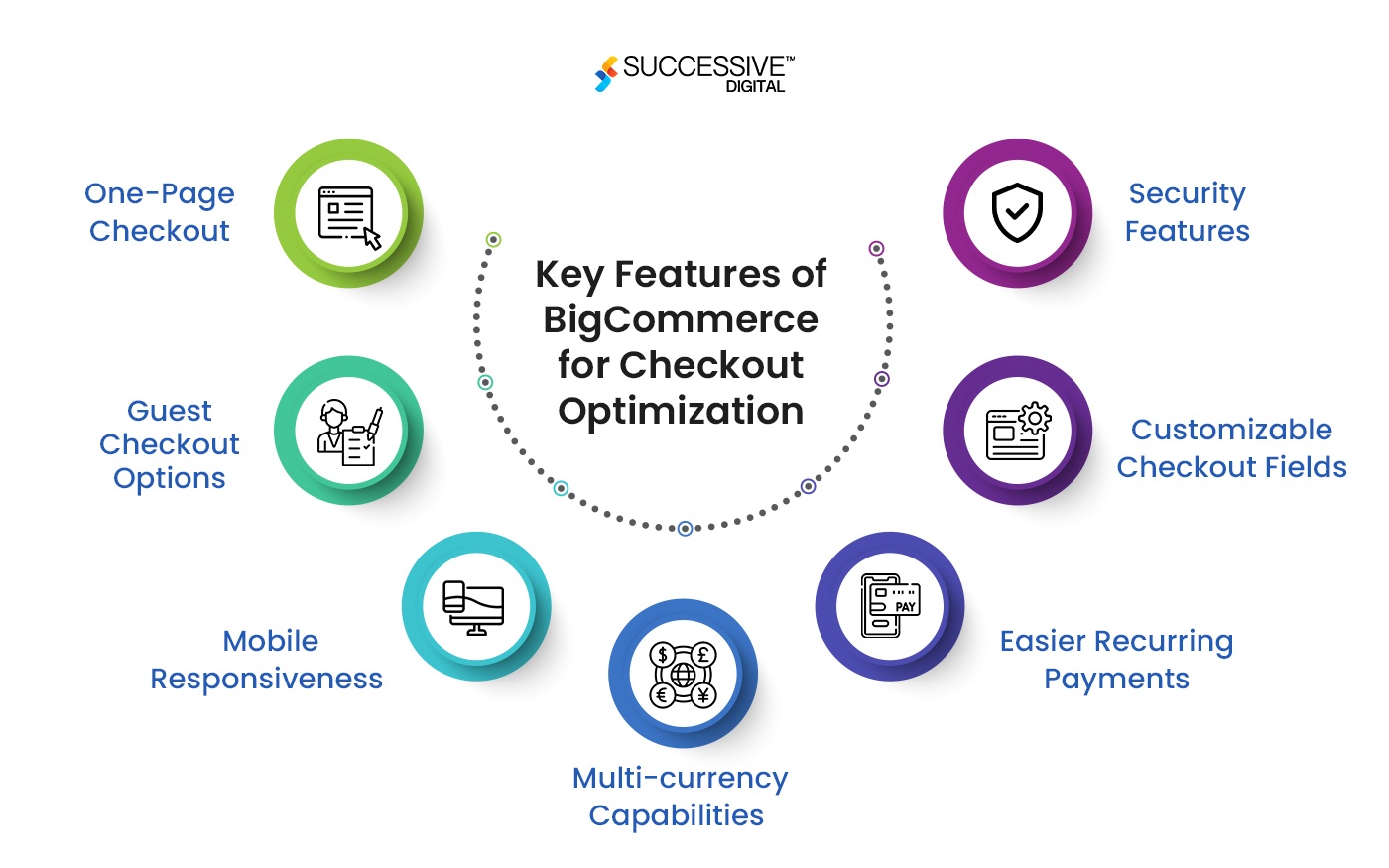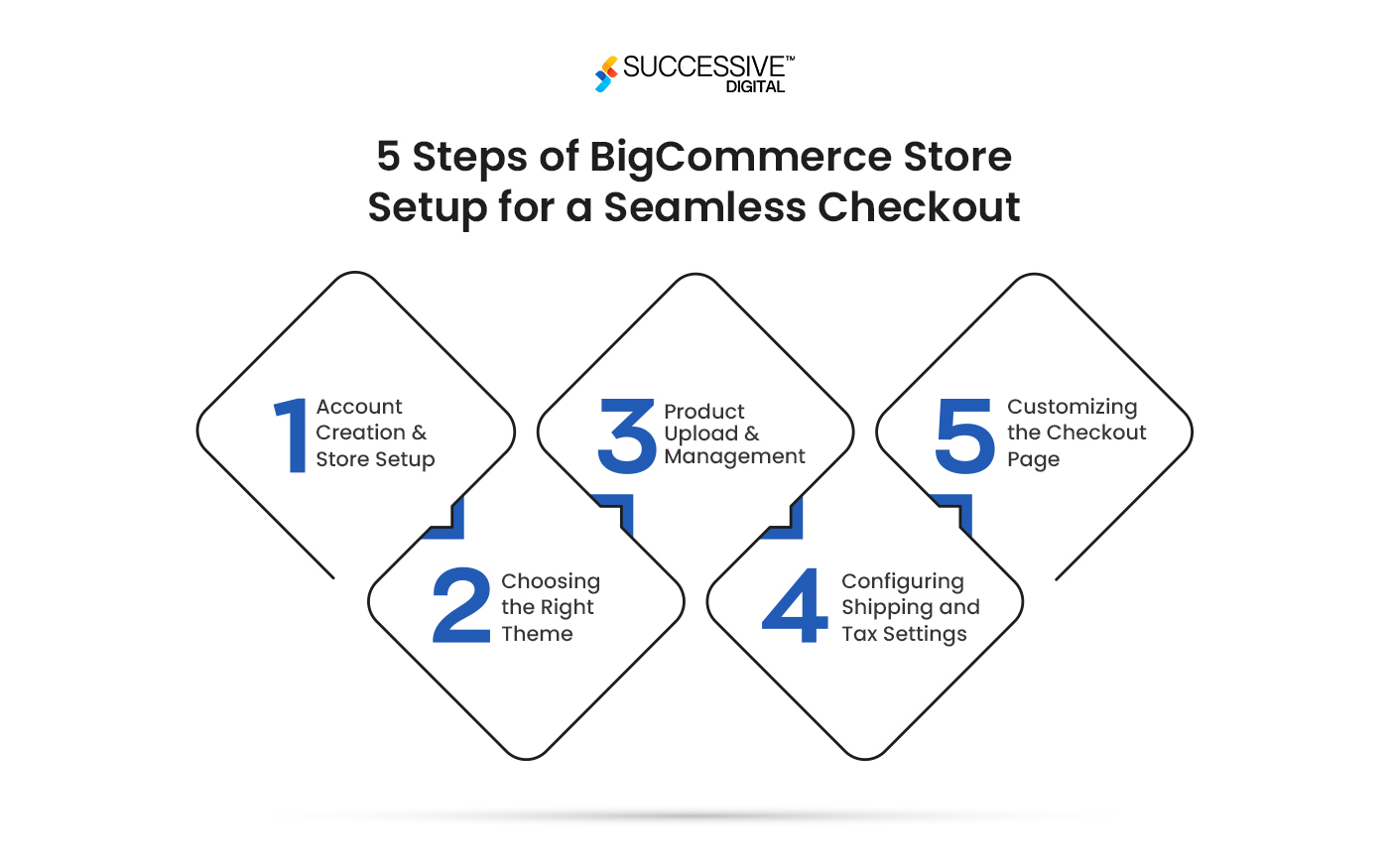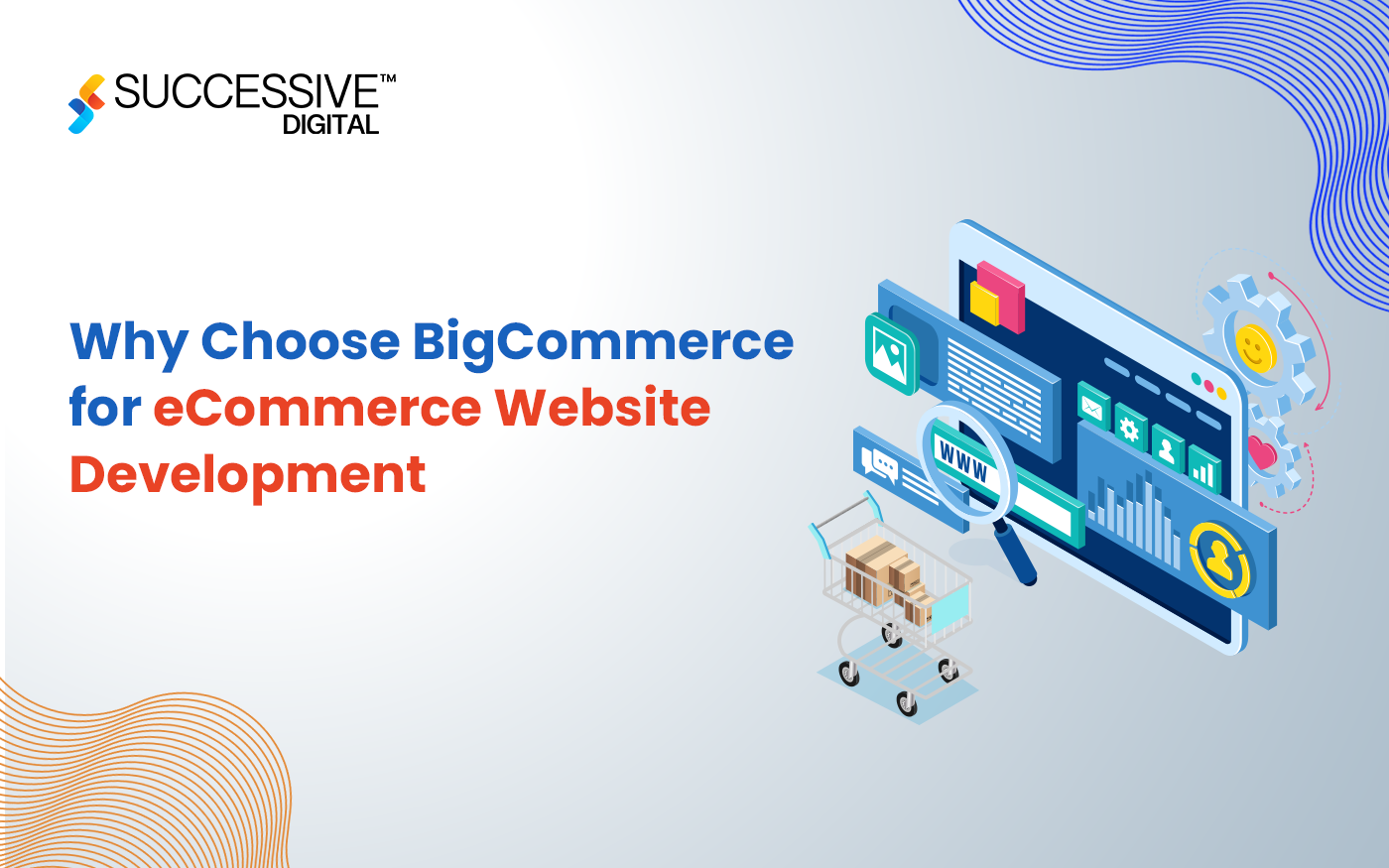With the growing demand for online shopping, users prefer faster product discovery and purchase processes. A seamless checkout fulfills the user’s preference for a rich online shopping experience. Various key touch points in digital commerce could make or break a sale, including a product page, the homepage, and the site search. However, a seamless and user-friendly checkout ensures higher conversion rates.
With the growing need for online retail, businesses looking to thrive in the eCommerce domain are forced to build a seamless checkout experience within their online store. However, successful checkout optimization requires choosing the right eCommerce platform, such as BigCommerce, that empowers businesses to create powerful eCommerce experiences and a streamlined customer’s purchase journey–from product search to checkout and delivery.
Additionally, BigCommerce also consists of a dedicated checkout SDK and API that helps in building custom shopping experiences. This blog is intended to guide businesses about the checkout optimization process using BigCommerce.
Seamless Checkout Experience: An Overview
Often underrated, the checkout process is a deal-breaker in digital commerce. A complex checkout often leads to increased cart abandonment and lower customer satisfaction.
Common Challenges in the Checkout Process
Some common challenges in a complex checkout process include:
- Complicated Forms
Lengthy forms can be off-putting. Simplifying them ensures customers do not get discouraged. Businesses need to make it easy for customers to provide necessary information instead of asking them to fill out complicated forms that lead to cart abandonment.
- Slow Loading Time
Waiting for pages to load can be irritating. Nobody likes staring at a loading screen, especially when making a purchase. A fast checkout keeps customers engaged and persuades them to buy a product in one go.
- Lack of Mobile Responsiveness
Online shoppers prefer using their smartphones to shop. If the checkout is not mobile-friendly, businesses will risk losing these customers. A mobile-friendly checkout means it works well on every device, making the process smoother for customers.
Why is Creating a Smooth Checkout Experience Important?
- Increase Conversion Rates
Checkout influences whether first-time visitors become actual buyers or abandon their carts. A hassle-free checkout increases customers’ likelihood of completing their purchases, accelerating conversion rates.
- Enhance Customer Satisfaction
Customers are often stuck in the loop of filling out complicated forms. This leads to a higher bounce rate of the website and customers abandoning the brand. Hence, building a smooth checkout is essential to avoid customer disloyalty, allowing them to make a purchase with minimal clicks and have a satisfactory shopping experience.
- Improve Brand Loyalty
If the checkout is smooth, customers feel more confident about the brand. Building trust means customers are more likely to choose your brand over others. A seamless checkout process isn’t just about finishing a purchase quickly. It’s about making customers happy, encouraging them to return, and building long-term brand trust.
Leveraging BigCommerce for Checkout Optimization
BigCommerce offers a comprehensive suite of tools, such as Checkout SDK and Checkout API. The SDK offers the BigCommerce development company end-to-end cart and checkout customization capabilities. On the other hand, Checkout API allows you to fully customize the checkout experience and alter the UX to better appeal to your target audience and increase conversion. This API also allows you to leverage BigCommerce’s checkout functionality to build a checkout experience on a remote platform, like a headless storefront or mobile app. Furthermore, BigCommerce also provides a global payments platform, Stripe, to streamline the payment process for eCommerce stores.
From shopping cart customization to payment fulfillment, it provides various features, ensuring a seamless checkout journey for your online customers. Some of the key features of BigCommerce include:

- One-Page Checkout
The one-page checkout feature in BigCommerce puts the entire transaction process into a single page. This simplification minimizes the steps customers need to take to complete a purchase, reducing the risk of cart abandonment. A one-page checkout is a proven method for streamlining the user experience, making it faster and more convenient for customers to move from product selection to order confirmation.
- Guest Checkout Options
Forcing customers to create an account before completing a purchase can be a significant barrier to faster purchases. BigCommerce recognizes the importance of flexibility in shopping and allows for guest checkouts. This means that first-time users can swiftly complete their transactions without creating an account, allowing a frictionless experience that caters to both time-conscious and first-time buyers.
- Mobile Responsiveness
As mobile commerce continues to surge, ensuring a seamless experience on various devices is paramount. BigCommerce’s mobile responsiveness ensures that the checkout process is as smooth on smartphones and tablets as on desktops. With a responsive design, businesses can capture sales from the growing demographic of mobile shoppers, enhancing accessibility and user satisfaction.
- Multi-currency Capabilities
Your store’s currency settings influence how your product prices appear on the storefront, which payment methods are available at checkout, and how shipping, tax, and discounts are calculated on orders. Displaying product prices and checkout in local currencies provides a more familiar shopping experience and can increase conversion when expanding the online store across multiple geographical areas.
- Easier Recurring Payments
Recurring billing is a convenient, attractive, and easy way to encourage heavy carts and better conversion rates by providing your customers with flexible ways to pay for goods and services. Customers can use recurring billing through subscription (paying for goods and services on a repeated schedule) and financing (buying now and paying later).
Recurring billing is especially useful for businesses that sell big-ticket items, subscriptions, and services or businesses with average carts of over $100. Shoppers who may not feel comfortable spending a large sum of money at one time often find these purchases more accessible when they are broken down into smaller payments over time.
-
- Customizable Checkout Fields
Every business is unique, as are its requirements for customer information during checkout. BigCommerce acknowledges this diversity by offering customizable checkout fields. Businesses can tailor the checkout page to collect specific information relevant to their operations, balancing gathering necessary details and minimizing customer effort.
- Security Features
Trust is the foundation of any successful online transaction. BigCommerce prioritizes the security of customer data by incorporating robust security features. BigCommerce servers are PCI DSS 3.2 certified at Level 1, which protects against credit card data breaches and eliminates the massive cost of handling compliance for businesses. It also provides SSL certificates that encrypt sensitive information, providing a secure environment for financial transactions. Displaying the security badges during checkout ensures customers that their data is handled with the utmost care, building trust and confidence in your brand.
Also read – Why Choose BigCommerce For eCommerce Website Development
Step-by-Step Guide to Setting up Your BigCommerce Store for a Seamless Checkout

Setting up your BigCommerce store is a foundational step toward creating a seamless checkout experience. The success of your eCommerce project depends heavily on the initial configuration of your online store. Fortunately, BigCommerce provides a user-friendly setup environment for this purpose.
Step 1 – Account Creation and Store Setup
Begin by signing up for a BigCommerce account. Follow the easy registration process, providing the necessary details about your business. Once registered, you will be guided through the initial setup process, including adding basic information about your store, such as its name, industry, and target audience.
Step 2 – Choosing the Right Theme
Once your account is set up, the next step is to choose the best-suited theme that aligns with your brand. BigCommerce provides a variety of themes, each with unique designs and functionalities. Explore the theme marketplace to find one that aligns with your brand identity and provides an intuitive user interface. Once you’ve selected a theme, customize it to match your brand colors, fonts, and overall aesthetic. Ensure that the theme is responsive to guarantee a seamless experience across devices. After that, Evaluate the theme’s impact on user experience. An intuitive design enhances navigation and contributes to a positive shopping experience.
Step 3 – Product Upload and Management
Post theme selection, you can add and manage your products within the BigCommerce dashboard. This includes uploading product images, setting prices, and organizing products into categories for easy navigation.
Step 4 – Configuring Shipping and Tax Settings
Now, your store is set up with your brand products. So, it’s time to set up shipping options and define tax rules to ensure accurate calculations during the checkout process. BigCommerce offers flexible shipping and tax configuration, allowing you to customize these settings based on your business requirements.
Step 5 – Customizing the Checkout Page
Within the BigCommerce dashboard, locate the checkout settings section. Here, you can access various options for customizing the checkout process. Tailor the checkout page to meet your specific business needs. This may include configuring shipping and payment options, defining checkout page URLs, and adjusting the display of order summary information.
Moreover, if your business requires additional information during checkout, state the BigCommerce development company to implement custom fields. This ensures that you gather relevant data without complicating the process for customers. Also, enable a ‘guest checkout option’ for first-time buyers and encourage them to complete their purchases without unnecessary hurdles. Once they have confidence in your brand, you can persuade them to create an account and become long-term customers.
Also read – Enhance Your Online Store Management with BigCommerce
Implementing Best Practices for Checkout Optimization
Checkout is pivotal when potential customers decide whether to complete a purchase or abandon their carts. Implementing best practices for checkout optimization is essential to minimize friction, enhance user experience, and increase conversion rates.
- Streamlining Checkout Flow
Long and complicated checkout processes can be a significant deterrent for customers. Streamlining the flow involves minimizing the steps required to complete a purchase. This can be achieved by consolidating information, combining unnecessary stages, and implementing a one-page checkout option. The goal is to create a frictionless journey encouraging users to move swiftly from cart to completion.
- Clear and Concise Product Information
Clarity is key when it comes to product information during the checkout process. Provide concise details about the items in the cart, including images, descriptions, and pricing. Clear product information helps customers confirm their choices, reducing the likelihood of confusion or dissatisfaction at the final stage.
- Optimizing Form Fields for User Convenience
A lengthy and complicated form can be a major turn-off for customers. Hence, simplify the input process by implementing auto-fill options for common fields such as name, address, and payment information. This feature significantly reduces the time and effort required from customers, contributing to a smoother and more efficient checkout experience. Utilizing browser-based auto-fill features or integrating third-party solutions can enhance this functionality.
- Utilizing Trust Signals to Build Customer Confidence
Displaying visible security badges is a powerful way to build trust with customers. Ensure that your checkout page prominently features SSL certificates and secure payment icons. Additionally, clearly communicate all costs associated with the purchase, including taxes and shipping fees, early in the checkout process. Provide links to detailed terms of service, return policies, and customer support contacts. This process will build confidence and boost customer loyalty.
Integrating Payment Options for Streamlining Checkout
One of the pivotal aspects of creating a seamless checkout experience is ensuring that your online store offers a diverse array of payment options to cater to the preferences of a broad audience. BigCommerce supports various payment gateways, allowing you to choose the ones that align with your target audience’s preferences and regional requirements.
The platform offers a comprehensive list of payment gateways for integration when setting up your checkout process. From traditional credit and debit card processors and digital wallets to alternative payment methods and Buy Now and Pay Later options, the platform ensures customers can complete transactions using their preferred payment mode.
Choosing the Suitable Payment Options
Understanding your target audience is key when deciding the payment options to integrate into your BigCommerce store. Different demographics and regions may have varying preferences regarding payment methods. Conduct market research to identify your target customers’ most commonly used payment options. This may include credit/debit cards, PayPal, Stripe, Apple Pay, Google Pay, and other region-specific methods.
Moreover, offering region-specific payment methods can be a strategic move if your business serves an international clientele. This will increase the likelihood of completing transactions, as customers appreciate the convenience of using familiar payment methods.
Testing payment processes to ensure reliability
Once you have integrated various payment options into your BigCommerce store, the next crucial step is to test these payment processes thoroughly. Regularly run transaction tests using different payment methods to ensure the entire payment process functions seamlessly, from initiation to confirmation.
Any glitches or discrepancies should be addressed promptly to maintain customer trust and confidence in your online store. In addition to functional testing, consider simulating various scenarios, such as successful transactions, failed transactions, and partial payments. This comprehensive testing approach helps identify and address potential issues before they impact real customer transactions.
Also read – Business Potential With BigCommerce Digital Marketplaces
Utilizing BigCommerce Analytics to Analyze and Elevate the Checkout Process
BigCommerce provides robust analytics tools that offer businesses with valuable insights and analytics reports regarding customer behavior around the checkout. These reports go beyond mere transaction tracking, providing a detailed understanding of how users interact with each element of the checkout page and helpful suggestions to make improvements. This helps them understand the reasons for cart abandonment and how they can improve customer’s experience. Here are the key types of analyses for tracking checkout behavior.
- User Flow Analysis: Utilize tools such as Google Analytics or BigCommerce’s built-in analytics dashboard to track the user journey from product selection to completion of the purchase. Identify the common paths users take and pinpoint any drop-off points.
- Abandoned Cart Analysis: Investigate the reasons behind abandoned carts. The BigCommerce’s carts report can provide information on when and why users abandon their carts, allowing you to implement targeted strategies to reduce abandonment rates.
- Form Analytics: Analyze form interactions to understand how users engage with input fields. Identify areas where users may struggle or abandon the process and optimize form fields accordingly.
- Page Load Times: Check for any slowdowns in page load times during the checkout process. Slow-loading pages can lead to frustration and abandonment, making it crucial to optimize for speed.
- Device and Browser Analysis: Understand your customers’ devices and browsers during checkout. Ensure your checkout is optimized for various devices and browsers to provide a consistent experience.
Making Data-Driven Improvements Based on User Behavior
With insights from analytics reports, businesses can make data-driven improvements to enhance the checkout experience. Here’s how:
- Optimizing Page Elements
Identify and optimize elements that are causing friction in the checkout process. Use data to prioritize and address issues, whether it’s a confusing form field or a slow-loading image.
- A/B Testing
Implement A/B testing to compare different versions of your checkout page. Test variations of button placements, form designs, or even the wording of calls-to-action to determine what resonates best with your audience.
- Personalization
Leverage data to personalize the checkout experience for your users. If certain customers consistently abandon their carts, consider personalized incentives or targeted email campaigns to encourage completion.
- Communication Improvements
If analytics reveal uncertainty around shipping costs or return policies, consider clarifying these aspects on the checkout page. Transparent communication can build trust and reduce hesitations.
- Mobile Optimization
If the analytics report concludes that a significant portion of your customers shop on mobile devices, then prioritize mobile optimization. Create a mobile-friendly checkout process that lets them shop easily from their preferred device.
By regularly analyzing user behavior through analytics tools and implementing data-driven improvements, businesses can ensure that the checkout process remains aligned with customer expectations and industry trends.
Conclusion
Creating an optimized checkout experience is a critical process that involves understanding user preferences and market trends, implementing best practices, and leveraging the capabilities of a robust eCommerce platform, such as BigCommerce.
By utilizing the best customization options and analytical tools of BigCommerce, businesses can create seamless shopping experiences for their customers and track their checkout processes, ultimately leading to improved conversion rates, customer satisfaction, and sustained success in the digital commerce landscape.












